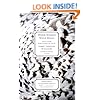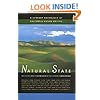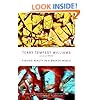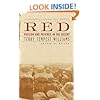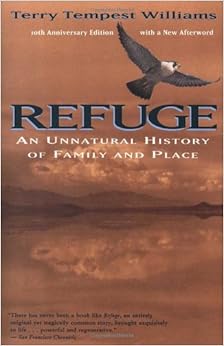


Flip to back
Flip to front

Refuge: An Unnatural History of Family and Place Paperback – September 1, 1992
See all 10 formats and editions
Hide other formats and editions

$12.14
FREE Shipping on orders over $35.
In Stock.
Ships from and sold by Amazon.com.
Gift-wrap available.
NO_CONTENT_IN_FEATURE
Tell the Publisher!
I'd like to read this book on Kindle
Don't have a Kindle? Get your Kindle here, or download a FREE Kindle Reading App.
I'd like to read this book on Kindle
Don't have a Kindle? Get your Kindle here, or download a FREE Kindle Reading App.
Choose Your Own Autobiography
Step right into Neil Patrick Harris's shoes in an exciting, interactive autobiography that places the reader squarely in the driver's seat. Learn more
Step right into Neil Patrick Harris's shoes in an exciting, interactive autobiography that places the reader squarely in the driver's seat. Learn more
Product Details
Would you like to update product info or give feedback on images?.
|
Editorial Reviews
Amazon.com Review
The only constants in nature are change and death. Terry Tempest Williams, a naturalist and writer from northern Utah, has seen her share of both. The pages of Refuge resound with the deaths of her mother and grandmother and other women from cancer, the result of the American government's ongoing nuclear-weapons tests in the nearby Nevada desert. You won't find the episode in the standard history textbooks; the Feds wouldn't admit to conducting the tests until women and men in Utah, Nevada, and northwestern Arizona took the matter to court in the mid-1980s, and by then thousands of Americans had fallen victim to official technology. Parallel to her account of this devastation, Williams describes changes in bird life at the sanctuaries dotting the shores of the Great Salt Lake as water levels rose during the unusually wet early 1980s and threatened the nesting grounds of dozens of species. In this world of shattered eggs and drowned shorebirds, Williams reckons with the meaning of life, alternating despair and joy.
From Publishers Weekly
Utah naturalist Williams ponders the loss of her mother to cancer and the disastrous flooding of a bird refuge in a moving account of the interrelations between personal tragedy and natural history. Author tour.
Copyright 1992 Reed Business Information, Inc.
Copyright 1992 Reed Business Information, Inc.
Important Information
Ingredients
Example Ingredients
Directions
Example Directions
Example Ingredients
Directions
Example Directions
More About the Author
She is the award-winning author of Leap, An Unspoken Hunger, Refuge & most recently Red - A Desert Reader. She lives in Castle Valley, Utah.
Customer Reviews
Most Helpful Customer Reviews
84 of 87 people found the following review helpful
By
Steven R. McEvoy
TOP 1000 REVIEWER on December 19, 2005
Format: Paperback
1 Comment
Sending feedback...
This book is so powerful and so moving, it brought me to tears in more than one place. This is an amazing story of place, family, love, and the desert. Last winter I had to read one of Williams' books for a course and have become addicted to her writings. Williams is a Mormon naturalist who pushes the boundaries of both, and her unique insights bring a freshness to both faith and preservation. I have tracked down and read all of her books that are currently in print, and this is the most powerful of them. Terry states in another book, "The great silences of the desert are not void of sound, but void of distractions." This book is about the silences and the distractions of death, the death of her mother and of the bird refuge that she loved and that was her solace. The chapter headings are unique, written as a journal, but not by date but by lake height. As the Great Salt Lake rose to record heights in the mid-1980's, Terry's mother was dying of cancer, and the Salt Lake's rising was flooding the Bear River Migratory Bird refuge. The refuge was sacred to Terry as a place she and her grandmother would visit together, and as a place to get alone outside of the city to reflect, meditate and believe.
Terry begins the prologue with "Everything about the Great Salt Lake is exaggerated - the heart, the cold, the salt, and the brine. It is a landscape so surreal one can never know what it is for certain. ... Most of the women in my family are dead. Cancer. At thirty-four, I became the matriarch of my family." pg.3. This book chronicles one woman's love of the desert, of the bird refuge and of her family. It tells the story of cancer clusters in the desert where the US Government tested thousands of nuclear devices from the 1940's to the 60's.Read more ›
Terry begins the prologue with "Everything about the Great Salt Lake is exaggerated - the heart, the cold, the salt, and the brine. It is a landscape so surreal one can never know what it is for certain. ... Most of the women in my family are dead. Cancer. At thirty-four, I became the matriarch of my family." pg.3. This book chronicles one woman's love of the desert, of the bird refuge and of her family. It tells the story of cancer clusters in the desert where the US Government tested thousands of nuclear devices from the 1940's to the 60's.Read more ›
Thank you for your feedback.
If this review is inappropriate, please let us know.
Sorry, we failed to record your vote. Please try again
52 of 55 people found the following review helpful
By
Michael Shea
on September 13, 2002
Format: Paperback
2 Comments
Sending feedback...
This is a unique book worth owning, reading, and pondering more than once. I am very grateful to Terry Williams for having had the courage to write it and have it published. I have had it added to our patient library.
As a medical and radiation oncologist with nearly a quarter century of experience, as a man whose parents died of unusual malignancies, and as the parent of a child with cancer, grief is a part of the experience of life with which I am well acquainted. This book is probably the most honest and eloquent expression of grief and the struggle of an extraordinarily sensitive woman with spirituality and loss as I have ever read. It is not without its faults, but even these are very revealing about the way human beings deal with a world in which change and loss are inevitable.
Faults? There are only two that come to mind. One is the title. There is nothing in this book that is unnatural in any way. Loss and sorrow are as natural as any other human experience. The second is the trap so many of us fall into of searching for cause and effect, a way to assuage grief by assigning blame that becomes evident in the final chapter. However, Mrs. Williams can be forgiven for that. She has left us with an insightful and lyrical account of her mother's illness and the comfort the beauty of the natural world brought to a daughter left alone. This is one woman with a sensitive and honest heart who is not afraid to let the rest of us look inside. There is much to be learned from what Mrs. Williams has written and Refuge is highly recommended.
By the way, Terry, one of your mother's doctors, Gary Johnson, delivered my son who was fortunate enough to survive his own battle with cancer 18 years later. It was a pleasure to see his name mentioned.Read more ›
As a medical and radiation oncologist with nearly a quarter century of experience, as a man whose parents died of unusual malignancies, and as the parent of a child with cancer, grief is a part of the experience of life with which I am well acquainted. This book is probably the most honest and eloquent expression of grief and the struggle of an extraordinarily sensitive woman with spirituality and loss as I have ever read. It is not without its faults, but even these are very revealing about the way human beings deal with a world in which change and loss are inevitable.
Faults? There are only two that come to mind. One is the title. There is nothing in this book that is unnatural in any way. Loss and sorrow are as natural as any other human experience. The second is the trap so many of us fall into of searching for cause and effect, a way to assuage grief by assigning blame that becomes evident in the final chapter. However, Mrs. Williams can be forgiven for that. She has left us with an insightful and lyrical account of her mother's illness and the comfort the beauty of the natural world brought to a daughter left alone. This is one woman with a sensitive and honest heart who is not afraid to let the rest of us look inside. There is much to be learned from what Mrs. Williams has written and Refuge is highly recommended.
By the way, Terry, one of your mother's doctors, Gary Johnson, delivered my son who was fortunate enough to survive his own battle with cancer 18 years later. It was a pleasure to see his name mentioned.Read more ›
Thank you for your feedback.
If this review is inappropriate, please let us know.
Sorry, we failed to record your vote. Please try again
29 of 30 people found the following review helpful
By
Timothy Ryan
on November 4, 2001
Format: Paperback
Comment
Sending feedback...
From the refuge of pain and loss in her Great Salt Lake desert world, Terry Tempest Williams weaves a beautiful and lyrical journal from the intricate fabric of landscape. A landscape that is both ravished by natural and perhaps man made destruction. The history of this land is the history of Williams' family and she serves the reader well as journalist, historian and naturalist.
In the spring of 1983 a significant rise in the Great Salt Lake began to flood her beloved Bear River Migratory Bird Refuge and at the same time cancer cells began to flood her mother's body. As owls, avocets and egrets struggle to survive the rising waters, Williams' mother struggles to find peace and comfort in dying. Where mother nature is damaged, mother Tempest is too.
Williams has a truly poetic ability to tie the spirit of land and of family into one beautiful image. "I am reminded that what I adore, admire and draw from Mother is inherent in the Earth. My mother's spirit can be recalled simply by placing my hands on the black humus of mountains or the lean sands of desert. Her love, warmth, and her breath, even her arms around me-are the waves, the wind, sunlight, and water.", she writes.
In the process of dealing with so much pain and loss Williams shifts from a casual observer of life's folly to passionate activist. Ultimately she puts the pieces of puzzle together to see a picture of generations of cancer certainly tied to exposure to the on-going nuclear testing by the American government in the Utah desert. William's chilling awakening to the manipulation of the environment by man in the name of progress should serve as our own wake-up call to the capacity of destruction that we have tolerated.
Landscape becomes refuge and offers hope of healing.Read more ›
In the spring of 1983 a significant rise in the Great Salt Lake began to flood her beloved Bear River Migratory Bird Refuge and at the same time cancer cells began to flood her mother's body. As owls, avocets and egrets struggle to survive the rising waters, Williams' mother struggles to find peace and comfort in dying. Where mother nature is damaged, mother Tempest is too.
Williams has a truly poetic ability to tie the spirit of land and of family into one beautiful image. "I am reminded that what I adore, admire and draw from Mother is inherent in the Earth. My mother's spirit can be recalled simply by placing my hands on the black humus of mountains or the lean sands of desert. Her love, warmth, and her breath, even her arms around me-are the waves, the wind, sunlight, and water.", she writes.
In the process of dealing with so much pain and loss Williams shifts from a casual observer of life's folly to passionate activist. Ultimately she puts the pieces of puzzle together to see a picture of generations of cancer certainly tied to exposure to the on-going nuclear testing by the American government in the Utah desert. William's chilling awakening to the manipulation of the environment by man in the name of progress should serve as our own wake-up call to the capacity of destruction that we have tolerated.
Landscape becomes refuge and offers hope of healing.Read more ›
Thank you for your feedback.
If this review is inappropriate, please let us know.
Sorry, we failed to record your vote. Please try again
